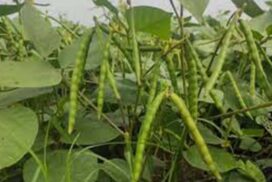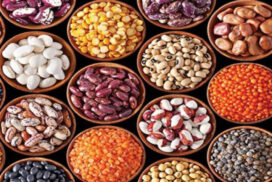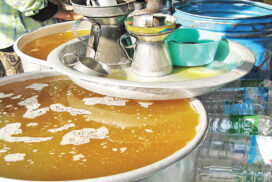The price of green gram plummeted following the weak foreign demand, according to the Yangon Region Chambers of Commerce and Industry (Bayintnaung).
The price of green gram from the central Myanmar region touched a high of K2.092 million per tonne in mid-May. The current price fell to K1.765 million per tonne, showing a sharp drop of K300,000 per tonne within one and half months.
In May, China’s tariff policies wreaked havoc on green gram trading, causing the price to decline.
Myanmar sent green gram to China, India, the Netherlands, Ireland, England and Germany by sea and border routes. It conveyed more than 148,000 tonnes of green grams worth US$97.426 million to foreign trade partners between 1 April and 23 June in the current financial year 2023-2024, according to the Ministry of Commerce’s trade data.
The country aims to achieve a green gram export target to 600,000 tonnes, with 150,000 tonnes in each batch, as per the Ministry of Commerce.
Myanmar’s green gram is primarily sent to India, China and European countries. Myanmar has grasped strong market share in the vast global markets. Additionally, Myanmar has been preparing to export green gram to European Union countries this year, according to the Ministry of Commerce.
The Ministry of Agriculture, Livestock and Irrigation and the Ministry of Commerce agreed to export the green grams for sprouts in 2015.
The steering committee has been holding a series of meetings to call for bids, conduct awareness courses for the farmers and inspect farm level processing regarding exports of the green grams for bean sprouts.
The Agriculture Department takes charge of farmer and collector inspection and testing, while the Consumers Affairs Department carries out processor inspection and training. Myanmar Inspection and Testing Service (MITS), the authorized organization of the State, was asked to monitor processor level to meet the criteria, food safety and quality standard set by the EU. Those inspectors from MITS are trained by the experts of the Plant Protection Division, Agriculture Department and the German Development Agency GIZ.
MITS conducted inspections annually, with nine in 2018, 10 in 2019, six each in 2020 and 2021 and five in 2022 respectively.
The MITS undertakes inspection once at a factory that meets the criteria and standard. If the MITS finds the requirements during inspection, they set a timeframe for the factory manager to fix them. Then, they went on a second inspection tour. They present certificates for those factories that pass the test. — NN/EM
Green gram market calms down on sluggish global demand
- July 05, 2023
- 399
















